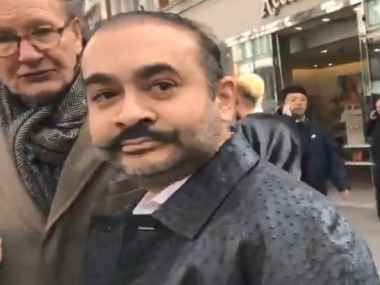London: A haven for the kings of bad times?

A screenshot of the Telegraph’s video, showing Nirav Modi in London.
Until his arrest, Nirav Modi, the fugitive diamond tycoon, had made a swish part of central London his home. Vijay Mallya, the self-proclaimed ‘King of Good Times’ who faces fraud charges in India, continues the high life in the English village of Tewin, 32 km north of London. Lalit Modi, the founding-chairman of the Indian Premier League and accused of financial irregularities, lives in the British capital. So does Sanjeev Kumar Chawla, a bookie wanted in a 2000 cricket match-fixing scandal. Chawla, in fact, has acquired a British passport and taken up a profession — Indian restaurateur — that presumably allows him to trade off his ethnicity.
Then there are Jatinder and Asha Rani Angurala. The couple is accused of defrauding the Bank of India in Jalandhar between 1990 and 1993. Now, British citizens, they were arrested in June 2015 at a shop they owned in southeast London. Extradition was refused in October 2018 because too much time had elapsed since the alleged offence.
So, is London the world’s fugitive capital, the best place to hide in plain sight?
It depends. A haven must be immune to the reasonable possibility of extradition and should be willing and able to absorb the proceeds of ill-gotten gains. London may not be a safe bet on either count.
In October 2016, Samirbhai Vinubhai Patel, accused of involvement in the 2002 post-Godhra riots, was extradited to stand trial in India. Patel was said to have made history. His repatriation was reportedly the first in the nearly 25 years since the UK and India signed an extradition treaty. But the Baker Commission, a UK government-appointed review of the extradition process, provides the following data for India for the 2004–11 period. Two requests were made — in 2007 and 2009. Both are marked as “surrenders”, which suggests decided receptiveness to Indian requests.
Patel’s extradition showed what was theoretically possible under the 1992 treaty with India. Then in February 2019, British home secretary Sajid Javid cleared Mallya and Chawla for extradition, though both have the right to appeal and that process could take months.
It’s not as if India’s extradition requests are always rejected and only the US gets its way. The US embassy in London says that between 2004 and 2011, the UK received 130 extradition requests, refused 10 and extradited 77 individuals. Some of these must have been alleged terrorists while the others were accused of white-collar crimes. The UK blocked Stuart Scott’s extradition to the US in July, 2018, to face charges of wire fraud. Two years earlier, it had refused to hand over British activist, Lauri Love, despite an indictment for allegedly “breaching thousands of computer systems”.
Extradition requests from Turkey, a Nato ally, are often turned down over human rights concerns. Ditto for Russia. Furthermore, London may be in the process of trying to rehabilitate its reputation as a haven for dirty money.
Until 2018, when the unexplained wealth order was incorporated into UK law, it was possible for someone like Zamira Hajiyeva from Azerbaijan to live in a chic London townhouse and shop at Harrods. Hajiyeva’s husband Jahangir was convicted in Azerbaijan in 2016 for embezzling money from a state-controlled bank. In December 2018, Hajiyeva received Britain’s first unexplained wealth order, which seeks proof of legal income for large purchases, especially if the buyer has ties to a foreign public official or a possible link to crime. Failure to prove a legitimate source of wealth could lead to seizure of property or other assets by the British government. This law is likely to make London less attractive to white-collar criminals and fraudsters. Before the wealth order, Britain was considered a destination for common crooks, drug lords and dictators.
A 2018 study by King’s College, London, showed that billions of pounds had flowed into the UK property market from foreign buyers, driving up house prices by more than a quarter in the 15 years since 1999. Russian individuals connected to President Vladimir Putin are thought to own properties worth close to £1.1 billion with Transparency International estimating that most were bought through “suspicious wealth”.
Though all London property purchases may not have been made with dirty money, the impression of ill-gotten gains has stuck. The threat of wealth orders may change the property landscape though the prospect doesn’t seem to weigh too heavy on Nirav Modi or Mallya. Mallya has a £11.5 million mansion complete with fountains, a four-car garage and a drive-slow sign with a picture of his four dogs. Modi was recently spotted walking to work — a new diamond business in the wealthy Soho neighbourhood — by a Daily Telegraph journalist. He was said to be wearing an ostrich leather jacket worth at least £10,000. A similar jacket featured in the wardrobe of Paul Manafort, a convicted felon who was once US president Donald Trump’s campaign manager.
Now, the law may be about to catch up with Modi. Back in 2011, the Baker report noted the need for extradition to “work promptly and efficiently … (otherwise) criminals would commit crimes without fear of prosecution, and movement abroad by criminals in search of safe havens would be indirectly encouraged”.
There isn’t much reason to dispute Britain is following the general principle on extradition and is cracking down on vast, unexplained foreign wealth, too. That the Modis and Mallyas, for now, seem to give the lie to all of the above is also apparent.

